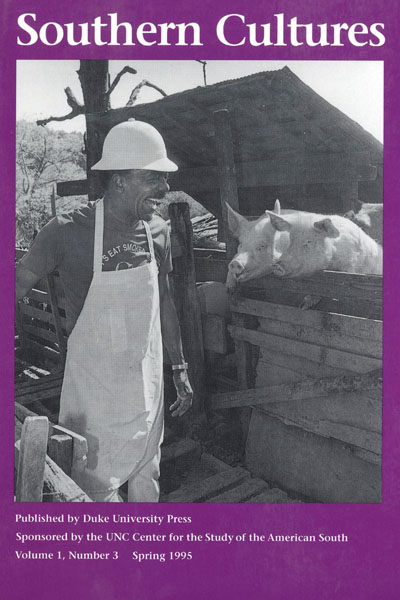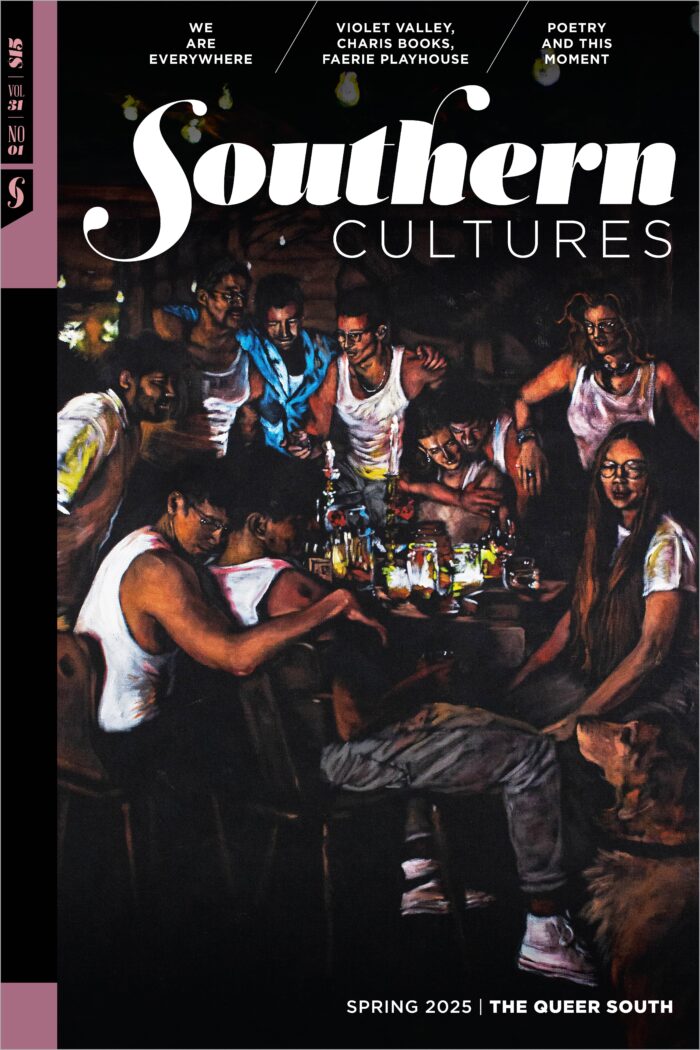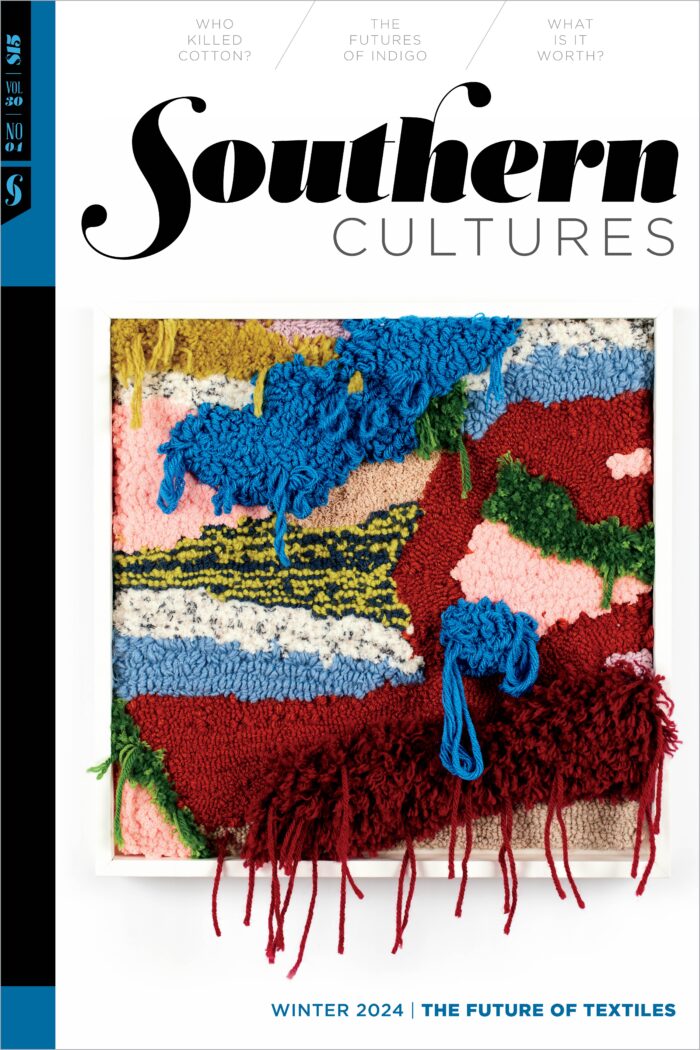by Harry L. Watson,
John Shelton Reed
Which is more “southern”: a Faulkner symposium or a barbecue joint? From this porch swing, there’s no easy answer because everybody we know agrees that southern cultures range widely, embracing everything from literature to down-home cooking, from the highbrow to the lowlife and back again.
by S. Jonathan Bass
“Both symbolically and in reality the hog has become ingrained in the culture of the South.” The “King of the Road,” Roger Miller, had a genuine understanding of the southern fondness for hogs. “In the scheme of things, in the way things go,” wrote Miller, “you might get bit by the old Fido, but not »
by Paul Harvey
“The baby boomers are having children (creating the so-called ‘baby boomlet’), returning to church in great numbers, and (not coincidentally) finding in country music (especially ‘suburban country’) a musical expression for their increasingly conservative tastes.” People magazine, that indispensable source for vital information on Americana, has once again sniffed out the Zeitgeist. In a recent »
by Richard H. King
More than twenty-five years on, the distinction Willie Morris once drew between the formative influences shaping New York intellectuals and southern intellectuals still strikes a resonant chord. As Morris wrote in North toward Home (1967): With the Eastern Jewish intellectuals … the struggle as they grew up in the 1930s was for one set of »
Poetry
by Charles Joyner
The South is an enigma,Secret and sacred.
by Pamela Grundy
The Jargon Society, 1993. Eighty-year-old Mamie Neugent leans over her kitchen table, plunging her head of long white hair into a metal bowl of water at the newspaper-covered edge. On the bowl’s rim, above the dampened print, she rests fingers swollen wide from age and use, their shape betraying the same kind of long working »
by Jessie Poesch
National Museum of American Art, 1991 The last twenty years or so have seen a growing number of substantial studies devoted to African American art, necessary since so much of this work has been virtually ignored in earlier surveys of American art. Richard Powell’s study of the life and work of William H. Johnson is »
by H. Trawick Ward
University Press of Florida, 1994 This book is the second to be written about Florida’s archaeology. The first, Florida Archaeology, by Milanich and Charles Fairbanks, was published in 1980. Because of the tremendous amount of research accomplished since then, this volume, which is almost twice as long as the first, was needed to incorporate more »
by Patricia B. Lerch
University Press of Florida, 1993 The Seminoles of Florida is a study of survival. Covington provides an extensive account of the transformation of the Creek Indians into Seminóles from the eighteenth through the twentieth centuries. The topic fascinates because he gives insight into the amazing human ability to persist against overwhelming force and odds. The »
by Walter Hickel
Oxford University Press, 1993 Few historians have dared to draw comparisons between American and European landed elites and the societies over which they presided. Logistical, linguistic, and conceptual problems abound; voluminous and complex historiographies have to be mastered. Shearer Davis Bowman courageously bridges the Atlantic divide in historical studies by pursuing two objectives in this »
by Margaret M. Geddy
Louisiana State University Press, 1992 Louisiana Women Writers is a commendable, albeit problematic, contribution to the existing scholarship on southern women writers. Although the exhaustive bibliography (admirably remedying a fifty-year gap in Louisiana’s bibliographic history) is both fascinating and highly readable, the biographical and critical essays are uneven, and several are too esoteric to be »
by David B. Parker
University of Georgia Press, 1993 As his children began to leave home in the 1890s, Joel Chandler Harris often took time away from his Uncle Remus stories and other projects to write letters to them. After Harris’s death in 1908 a number of these letters were reprinted or excerpted in Uncle Remus’s Home Magazine and »
by Allan D. Charles
University Press of Kentucky, 1992 John H. Ellis has written an excellent study of yellow fever and public health in the postbellum South, using as case studies the three largest cities of the late nineteenth-century South: New Orleans, Memphis, and Atlanta. His story is two-fold. He highlights the history of epidemics in New Orleans and »
by Nell Irvin Painter
Louisiana State University Press, 1993 The frontispiece and dust jacket of Jacqueline Goggin’s Carter G. Woodson show a photographic portrait of Woodson identified merely as “in middle age.” He looks past the camera, mouth set firmly in the next best thing to a scowl. The photo is retouched, but a less formal shot in the »
by Jerrilyn McGregory
Oxford University Press, 1993 Walter Pitts’s premature death, 20 July 1991, is our true misfortune, for his scholarship can be labeled cutting edge, groundbreaking, and most innovative. The Old Ship of Zion is a significant contribution to the fields of sociolinguistics, ritual anthropology, ethnomusicology, and African American folklore—a cross-cultural investigation that ultimately covering the African »
by Wayne Flynt
University of Alabama Press, 1993 For several decades historians have disputed the value of calling tape-recorded oral interviews “history.” No one doubts the usefulness of personal reminiscence when used as one of many sources. But as freestanding accounts of past events, oral memory claims remain dubious for many historians. Despite such skepticism, few question the »
by Leslie Dunbar
General Hall, Inc., 1994 Autobiographical writing must require some degree of boldness. Politicians and generals and other “stars” of our firmament have that, usually in abundance. More modest human beings have to make a case for claiming other people’s attention. Lewis Killian does. He does by giving us several ways of reading this, his latest »
by Charles W. Eagles
Oxford University Press, 1992 Most people have some notion about what freedom meant for the civil rights movement: fairness in the judicial system, equal access to public accommodations, the right to vote, and an end to racial discrimination. Scholars such as Clayborne Carson have recognized the centrality of freedom to the movement by suggesting that »
by John Shelton Reed
“It appears that favorable opinions about the banner are more widespread than the flag itself.” The rebel flag (properly, the battle flag of the Army of Northern Virginia) is increasingly an “embattled emblem,” as a recent exhibit and symposium at the Museum of the Confederacy in Richmond recognized and illustrated. A few surveys, mostly recent »
by Herbert J. Hartsook
“Constituent case files provide important information on the effects of government on the populace and the manner in which government interacts with them.” Sir John Seeley, in his book The Growth of British Policy (1895), wrote, “History is past politics, and politics present history.” In their work to document recent history, archival, and special collections, »
by John Steele Henderson
The following letter was written by fourteen-year-old John Steele Henderson to his father, Archibald Henderson, reporting on a Whig political rally in piedmont North Carolina on the eve of the presidential election of 1860. The Hendersons were Democrats, and John didn’t much like what he heard at the rally, but like a true connoisseur, he »





